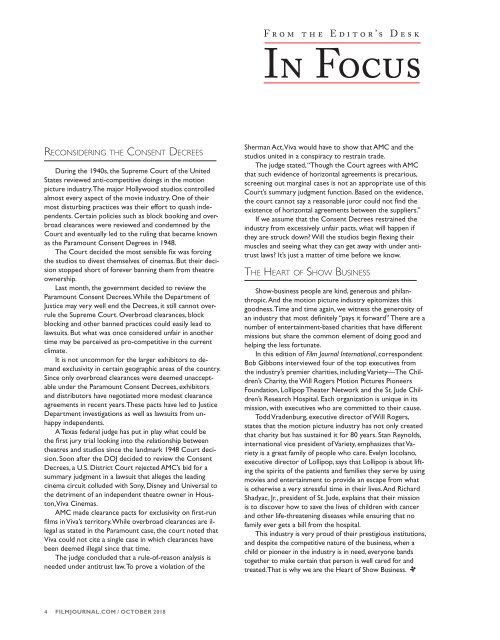Create successful ePaper yourself
Turn your PDF publications into a flip-book with our unique Google optimized e-Paper software.
From the Editor’s Desk<br />
In Focus<br />
Reconsidering the Consent Decrees<br />
During the 1940s, the Supreme Court of the United<br />
States reviewed anti-competitive doings in the motion<br />
picture industry. The major Hollywood studios controlled<br />
almost every aspect of the movie industry. One of their<br />
most disturbing practices was their effort to quash independents.<br />
Certain policies such as block booking and overbroad<br />
clearances were reviewed and condemned by the<br />
Court and eventually led to the ruling that became known<br />
as the Paramount Consent Degrees in 1948.<br />
The Court decided the most sensible fix was forcing<br />
the studios to divest themselves of cinemas. But their decision<br />
stopped short of forever banning them from theatre<br />
ownership.<br />
Last month, the government decided to review the<br />
Paramount Consent Decrees. While the Department of<br />
Justice may very well end the Decrees, it still cannot overrule<br />
the Supreme Court. Overbroad clearances, block<br />
blocking and other banned practices could easily lead to<br />
lawsuits. But what was once considered unfair in another<br />
time may be perceived as pro-competitive in the current<br />
climate.<br />
It is not uncommon for the larger exhibitors to demand<br />
exclusivity in certain geographic areas of the country.<br />
Since only overbroad clearances were deemed unacceptable<br />
under the Paramount Consent Decrees, exhibitors<br />
and distributors have negotiated more modest clearance<br />
agreements in recent years. These pacts have led to Justice<br />
Department investigations as well as lawsuits from unhappy<br />
independents.<br />
A Texas federal judge has put in play what could be<br />
the first jury trial looking into the relationship between<br />
theatres and studios since the landmark 1948 Court decision.<br />
Soon after the DOJ decided to review the Consent<br />
Decrees, a U.S. District Court rejected AMC’s bid for a<br />
summary judgment in a lawsuit that alleges the leading<br />
cinema circuit colluded with Sony, Disney and Universal to<br />
the detriment of an independent theatre owner in Houston,<br />
Viva Cinemas.<br />
AMC made clearance pacts for exclusivity on first-run<br />
films in Viva’s territory. While overbroad clearances are illegal<br />
as stated in the Paramount case, the court noted that<br />
Viva could not cite a single case in which clearances have<br />
been deemed illegal since that time.<br />
The judge concluded that a rule-of-reason analysis is<br />
needed under antitrust law. To prove a violation of the<br />
Sherman Act, Viva would have to show that AMC and the<br />
studios united in a conspiracy to restrain trade.<br />
The judge stated, “Though the Court agrees with AMC<br />
that such evidence of horizontal agreements is precarious,<br />
screening out marginal cases is not an appropriate use of this<br />
Court’s summary judgment function. Based on the evidence,<br />
the court cannot say a reasonable juror could not find the<br />
existence of horizontal agreements between the suppliers.”<br />
If we assume that the Consent Decrees restrained the<br />
industry from excessively unfair pacts, what will happen if<br />
they are struck down? Will the studios begin flexing their<br />
muscles and seeing what they can get away with under antitrust<br />
laws? It’s just a matter of time before we know.<br />
The Heart of Show Business<br />
Show-business people are kind, generous and philanthropic.<br />
And the motion picture industry epitomizes this<br />
goodness. Time and time again, we witness the generosity of<br />
an industry that most definitely “pays it forward” There are a<br />
number of entertainment-based charities that have different<br />
missions but share the common element of doing good and<br />
helping the less fortunate.<br />
In this edition of <strong>Film</strong> <strong>Journal</strong> International, correspondent<br />
Bob Gibbons interviewed four of the top executives from<br />
the industry’s premier charities, including Variety—The Children’s<br />
Charity, the Will Rogers Motion Pictures Pioneers<br />
Foundation, Lollipop Theater Network and the St. Jude Children’s<br />
Research Hospital. Each organization is unique in its<br />
mission, with executives who are committed to their cause.<br />
Todd Vradenburg, executive director of Will Rogers,<br />
states that the motion picture industry has not only created<br />
that charity but has sustained it for 80 years. Stan Reynolds,<br />
international vice president of Variety, emphasizes that Variety<br />
is a great family of people who care. Evelyn Iocolano,<br />
executive director of Lollipop, says that Lollipop is about lifting<br />
the spirits of the patients and families they serve by using<br />
movies and entertainment to provide an escape from what<br />
is otherwise a very stressful time in their lives. And Richard<br />
Shadyac, Jr., president of St. Jude, explains that their mission<br />
is to discover how to save the lives of children with cancer<br />
and other life-threatening diseases while ensuring that no<br />
family ever gets a bill from the hospital.<br />
This industry is very proud of their prestigious institutions,<br />
and despite the competitive nature of the business, when a<br />
child or pioneer in the industry is in need, everyone bands<br />
together to make certain that person is well cared for and<br />
treated. That is why we are the Heart of Show Business. <br />
4 FILMJOURNAL.COM / OCTOBER <strong>2018</strong><br />
004-008.indd 4<br />
9/5/18 6:09 PM

















